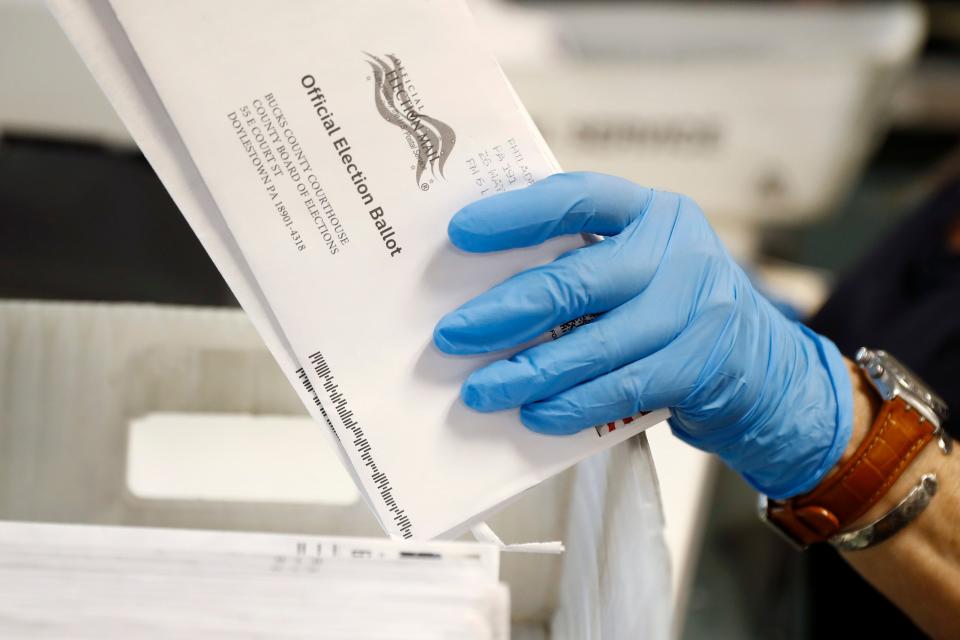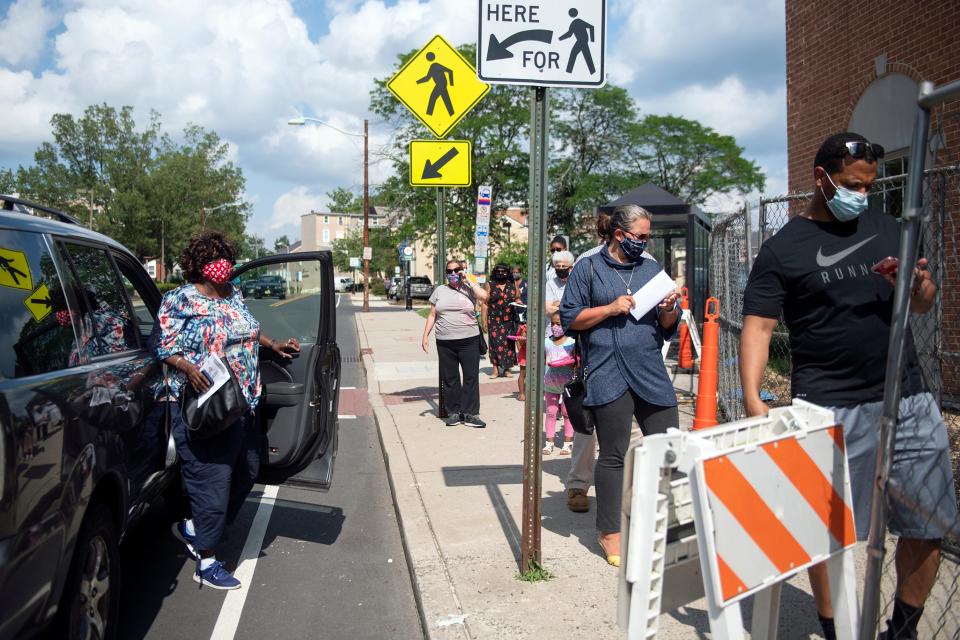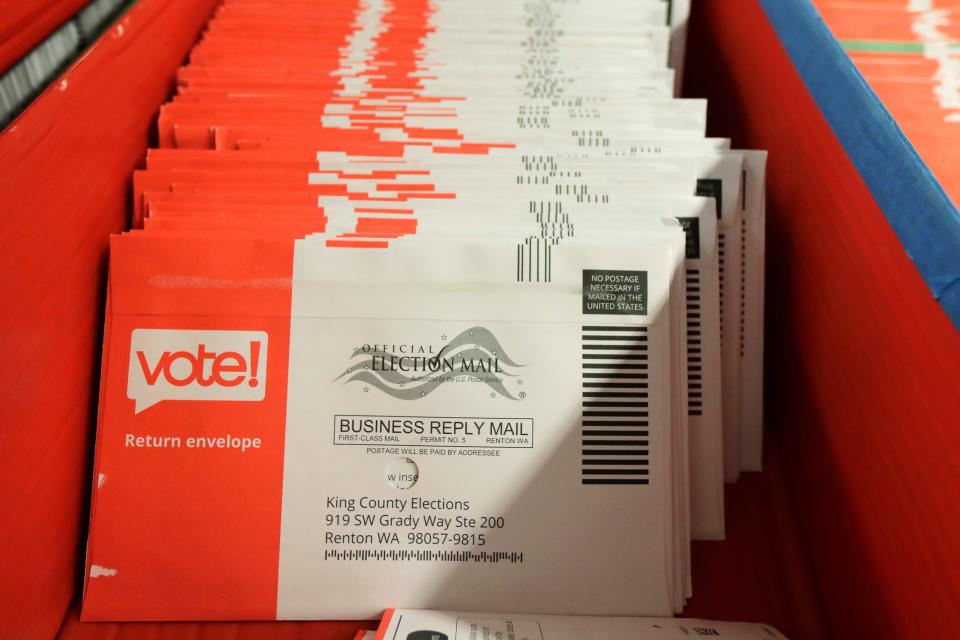Fact check: New Jersey ballot fraud case doesn't signal 'national trouble' with vote by mail
The claim: Mail-in ballot fraud in New Jersey is a sign of bigger issues.
An article, "Mail-In Ballot Fraud in New Jersey Signals National Trouble" published July 15 on the website run by Judicial Watch, uses the arrest of four men in New Jersey on voter fraud allegations as evidence for “national trouble” if more American states move to vote-by-mail systems ahead of the 2020 election.
Judicial Watch is a "conservative, nonpartisan educational foundation, according to its website, and states its purpose as promoting "transparency, accountability and integrity in government, politics and the law,"
An email request for comment from the post’s author was not returned.
More: 'He's scaring our own voters': Republicans run into a Donald Trump problem as they push mail voting
What happened in Jersey
Four men from New Jersey were charged with multiple counts of voting fraud after the U.S. Postal Inspection Service reported finding hundreds of ballots in a single mailbox during a May election for the city of Paterson. The election was the first there conducted completely by mail, due to the COVID-19 pandemic.
The Judicial Watch article alleges this is what happened: “The scheme appears to have been simple: the men collected blank ballots, forged the paperwork and signatures, and submitted fake votes.”
This is inaccurate.
First, a bit of background on the state's election law: New Jersey has three ways to legally submit a mail-in ballot. Voters can put it in the mail themselves, deliver it to the local board of elections or designate a “bearer” to drop off their ballot. “Bearers” must identify themselves on the ballot. They cannot collect and deliver more than three ballots, and they cannot be a candidate in the election, according to New Jersey election law.
More: New Jersey election will be held mostly by mail in November, governor says
On June 25, state Attorney General Gurbir Grewal charged Paterson City Councilman Michael Jackson, Councilman-Elect Alex Mendez, Shelim Khalique and Abu Razyen with the crimes, saying they collected and delivered more than three ballots each and did not identify themselves as the “bearer.”
Mendez also was accused of submitting one or more voter registration applications where he allegedly knew the person was not eligible to vote in the district. He pleaded not guilty. New Jersey also alleged that Jackson received one ballot that wasn’t sealed, and that ballot was subsequently delivered to the board of elections in a sealed envelope without information identifying the bearer.
More: Fact check: Mailing ballots to dead people not leading to voter fraud, experts and studies say
Nowhere in any of the charging documents or public statements made by officials in New Jersey does it allege that any of the four men voted on someone else’s behalf.
Evidence for the claim
Judicial Watch points to two articles to describe the situation, one from Real Clear Politics and another from InsiderNJ.com.
The Real Clear Politics report notes a woman named Ramona Javier told NBC 4 New York that she never received a ballot despite being listed as having voted. “This is corruption,” Javier said. “This is fraud.”
When asked about Javier's claim to the television station, the attorney general’s office declined to comment. “We are not releasing any additional information at this time, beyond what is in the press release and complaints,” spokesman Peter Aseltine wrote in an email.

Judicial Watch stated “nearly 20% of the 16,000 ballots were disqualified." That claim is correct; however, it needs context.
The Passaic County Board of Elections tossed out 3,190 mail-in ballots, or about 19% of those submitted, according to Northjersey.com. Of those, 800 ballots were improperly bundled. Election workers rejected the remaining 2,300 for other concerns, including signatures on the ballots not matching the ones on file.
Voters signatures need to 'cure'
There are lots of reasons — that aren’t fraud — for a signature mismatch, Colorado Secretary of State Jena Griswold said.
Her state has voted almost entirely by mail since 2014. Griswold said someone’s signature can change due to a health event or an ongoing medical condition. Or it could be a natural variation in the way someone signs his or her name.
More: Voting by mail is popular in Florida, despite President Trump's criticisms
“The percentage of folks who have to ‘cure’ is higher for younger people because they don’t have as many signatures in our system,” Griswold said.
Signature curing means verifying if a signature is valid.
To do this, Colorado uses bipartisan teams who compare the signature on every ballot to ones the state has on file for every registered voter. If there’s a mismatch, they alert the voter. Any accusations of fraud get referred to the Colorado Attorney General’s office.
“The general referral rate in our 2018 general election was 0.0027%,” Griswold said.
More: Fact check: A fake tweet claims AOC urged governors to shut down businesses to hurt Trump
In New Jersey, local news reports alleged that this kind of process was challenging for boards of election. An NPR fact-check of the municipal election cites officials as having “warned of hiccups in matching signatures, processing paper ballots and receiving the mail on time.”
The rejection rate for the other 30 local elections held in New Jersey this May was 8.1%, according to data from the New Jersey secretary of state’s office.
Ballot fraud 'easy'?
Judicial Watch also claims in its article that “ballot fraud is easy,” and “that the national rush to mail-in balloting has left plenty of room for fraud and error.” However, it ignores the fact that states have voted by mail for years.
Oregon can trace its vote-by-mail roots to a statewide special election in 1996. Colorado implemented its system of mailing ballots to registered voters in 2014, and Utah started in 2013.
More: Facebook labeling Trump, Biden posts on voting
About 14% of Americans cast their ballots outside traditional polling locations (i.e. by mail or designated drop off boxes) in 2000, and that increased to 21% in 2016, according Census Bureau voter data.
Voters in 29 states and the District of Columbia can cast a ballot by mail without documented reason, such as being out of town on Election Day. In those states, about one in five voters uses that option, according to the Pew Research Center.
Security experts and even President Donald Trump’s own Cabinet have repeatedly praised Colorado as being the safest state in the nation to cast a vote because it keeps paper ballots, uses signature verification and conducts random, risk-limiting audits.
“We’d love to continue to use you as an example of what other states can adopt,” then-Homeland Security Secretary Kirstjen Nielsen said at a cybersecurity training in Denver in 2018.

Colorado’s secretary of state said she’s been working with at least six states on how to implement the Colorado model.
“Colorado is proof of how mail ballots work and are secure,” Griswold said. “You just have to look towards us as evidence of a state with a very clean history of using mail in ballots.”
Voter fraud in all forms is also rare. The Heritage Foundation, a conservative think tank, maintains an online database of fraud cases. The database is not a comprehensive roundup but a sampling of proven cases that goes back to 1979.
An analysis of the 1,200 cases in that database by professor Charles Stewart, who runs the MIT Data and Election Science Lab, and National Vote At Home Institute CEO Amber McReynolds found 204 involved absentee ballots. Those led to 143 criminal convictions.
In an opinion piece in The Hill published in April, Stewart and McReynolds write: "One hundred forty-three cases of fraud using mailed ballots over the course of 20 years comes out to seven to eight cases per year, nationally. It also means that across the 50 states, there has been an average of three cases per state over the 20-year span. That is just one case per state every six or seven years. We are talking about an occurrence that translates to about 0.00006 percent of total votes cast."
They also note: "There is no evidence that mail-balloting results in rampant voter fraud, nor that election officials lack the knowledge about how to protect against abuses."
More: Fact check: Ronald Reagan didn’t say Democrats would restrict freedoms
The president, however, has stood firm against voting by mail for months.
Trump has reprimanded states that are moving to expand mail-in voting amid the pandemic and has warned that voting by mail will lead to widespread voter fraud, without citing evidence.

“Mail-In Voting is already proving to be a catastrophic disaster. Even testing areas are way off,” Trump tweeted on July 30. “The Dems talk of foreign influence in voting, but they know that Mail-In Voting is an easy way for foreign countries to enter the race. Even beyond that, there’s no accurate count!”
And in May he said, “Mail-in ballots are a very dangerous thing” that are “subject to massive fraud.” Those statements drew unprecedented action from Twitter, which linked information to refute those inaccuracies with the president’s tweet.
Utah Sen. Mitt Romney has rejected these arguments of fraud, telling reporters in May that, “In my state, I’ll bet 90% of us vote by mail. It works very, very well, and it’s a very Republican state.”
On Aug. 4, the president reversed course on this related specifically to Florida, though, tweeting that his supporters there should request an absentee ballot and vote by mail because the election system in the Republican-run battleground state is "Safe and Secure, Tried and True."
More: Fact check: Immigrants in US illegally aren't eligible for federal welfare; Trump did not ban it
Our ruling: Missing context
We rate the claim that mail-in ballot fraud in New Jersey is a sign of bigger issues as MISSING CONTEXT, based on our research. It’s true that charges of corruption have been made in a local New Jersey election conducted by mail. But assertions by Judicial Watch about how that case shows a systematic problem with voting by mail are not supported by their evidence. The article fails to note that several states have voted entirely by mail for as many as 20 years with fraud cases being an extreme rarity, and that states have protections in place to ward against election fraud.
Our fact-check sources:
NPR, July 1, "N.J. Election Fraud Case Draws A Trump Tweet But Suggests Safeguards Are Working."
State of New Jersey, Department of Law and Public Safety, June 25, "AG Grewal Announces Voting Fraud Charges Against Paterson Councilman Michael Jackson, Councilman-Elect Alex Mendez, and Two Other Men."
NorthJersey.com, May 20, "Officials disqualify 19% of votes cast in Paterson election."
CBS News, Jan. 27, 2018, "Former Colorado GOP chairman sentenced for voter fraud."
Denver Post, Sept. 6, 2018, "Colorado tops U.S. in vote security, Homeland Security head says."
New York Times, May 26, "Twitter Refutes Inaccuracies in Trump’s Tweets About Mail-In Voting."
Salt Lake Tribune, May 18, "Heavily Republican Utah likes voting by mail, but national GOP declares war on it."
Washington Post, May 10, 2018, "The Cybersecurity 202: How Colorado became the safest state to cast a vote."
The Heritage Foundation, "A Sampling of Recent Election Fraud Cases from Across the United States."
The Hill, April 28, "Let's put the vote-by-mail 'fraud' myth to rest."
Anna Staver is a statehouse reporter for the Columbus Dispatch. Reach her at astaver@dispatch.com or via Twitter at @AnnaStaver.
Thank you for supporting our journalism. You can subscribe to our print edition, ad-free app or electronic newspaper replica here.
Our fact check work is supported in part by a grant from Facebook.
This fact check is available at IFCN’s 2020 US Elections FactChat #Chatbot on WhatsApp. Click here, for more.
This article originally appeared on USA TODAY: Fact check: NJ ballot fraud case doesn't signal 'national trouble'

